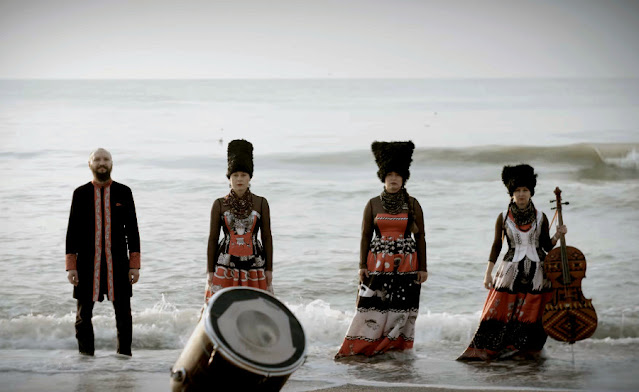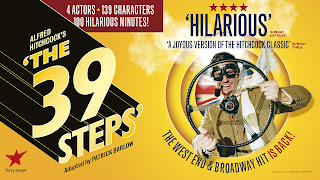Musical Review: Spring Awakening
On Wednesday I had the pleasure of seeing the Almeida Theatre's production of Spring Awakening. Spring Awakening is one of my favourite musicals, I fell in love with the show whilst in six form and have been listening to soundtrack ever since. So being able to see the show on stage produced a great amount of happiness and excitement within me. Whilst I could write an in-depth review about this particular production of Spring Awakening, I want to delve deeper into the show itself, not the particulars of each production such as costume design or chorography. Indeed, instead I will discuss the shows source material, its plot and its score to highlight what is truly great about this musical.
Spring awakening had its Broadway debut in 2006 but was based on a play by Frank Wedekind which was first published in 1891. At the time it was written the play was extremely polarizing, often warranting it to be banned or censored due to its controversial themes. But its controversial themes are perhaps what makes it extraordinary, especially when one remembers how old the source material is. Spring Awakening tells the story of several German teenagers living in a society where traditional Christian morals takes precedence and repression of the voices of the young is ever present. It is of course a critique on Wedekinds part of the society for which he was living, which had placed great emphasis on conservative morality as well as a certain leaning towards authoritarianism under its current Kaiser.
Throughout the musical we see a number of characters struggle to understand the idea of sex and desire due to a conservative society 'shielding' them from the notion of sexual intercourse completely, Wendla (the main the female character) for example is told procreation occurs if one loves another deeply, she is not told anything of sexual reproduction. As such many of the characters are left confused by their current feelings formed under puberty. Indeed, the only character who seems to have substantial knowledge on this subject is Melchior who rebels against the current society by being an atheist and gaining his knowledge from books rather than his teachers, yet in only reading about sex and not being able to ask questions on the topic we can see that Melchior perhaps misses the more emotional aspects of a relationship. Indeed, Spring awakening the play, and therefore the musical, criticises deeply this notion of shielding your child from that which is considered sinful as not only will they discover those ideas themselves but that their general lack of proper education on the topic will lead them down a dangerous path, shown through Wendla’s pregnancy. Furthermore, the musical also reflects on how the pressure of expectations from ones parents and society can deeply effect a young mind. Indeed, the musical portrays Moritz, Melchior’s best friend, as a clearly depressed and anxiety ridden young man who is only made worse off by a society who only values him for his academic skills, casting him out as an idiot for not adapting well enough to the stringent education system in place. With Moritz's story ending in tragedy this topic still seems extremely relevant today.
Indeed, what makes spring awakening a special musical is that it is extremely interesting to watch knowing that it is based on a play which was extremely polarising for its time period which showcases taboo topics for the time such as by presenting a gay couple and openly criticising societies conservative values. But it is also wonderfully written as it also showcases a sentiment which remains extremely relevant today. Indeed, as the musical highlights, in 19th century Germany young people’s voices were ignored despite their ideas being ones of a better future, without child abuse and where you can love without shame, yet this theme is still incredibly important today as we often ignore young people’s voices to maintain authority and due to the notion that with age comes wisdom, despite their views being better than our own. Moreover, Spring Awakening portrays their teenage characters with a form of realism that haunts you long after the show. No character is a better example of this than Moritz who emulates naivety and kindness but is ultimately rejected by society, his rejection comes due to not fitting in with the status quo, often falling asleep in class and barely scrapping by on his exams, he is seen as weird by fellow teenagers and it chastised by his father for failing. His feelings of being isolated from society would generally resonate with a lot of people today and his hopelessness on solving the problem he did not create would also be relevant. Indeed, the story of spring awakening provides enjoyment from both its historical aspects but also the harrowing themes we still recognise in our world today.
This is of course to talk of the show without the music, and what is a musical without music. The music in spring awakening is largely that of rebellion, it symbolises how the teenagers are feeling but would likely never say to their elders, how they really wish to act. Many lyrics are lude or feature innuendos, words we are more familiar with teenagers using today than back in the 1800’s, but still phrases that adults today would chastise teenagers for and therefore to speak them is to rebel against ones parents thus the establishment. Furthermore, much of the music is of the rock genre leaning more on the style of bands such as Green Day over the original rock of Elvis. This musical style juxtaposes the setting as of course it is a genre that has not been invented in 1800’s Germany yet at the heart of genre is a certain anger towards the system which is very alive in the teenagers in the play as it is in many teenagers today. The fact none of the adult characters sing, instead having the only adult character join in a song be the liberal caring mother of Melchior who only speaks her lines, highlights how the rock music is what separates them from a society that wants them to fall in line with conservative values. Indeed, the rock genre fits very well with the story being told. But of course, there are some melancholic tunes in the show which emphasise the horrific nature of a society which oppresses its youth. Perhaps one of my favourites of these is ‘Those you’ve Known’ a reprise of Melchior’s opening song ‘All that’s Known’. ‘All that’s Known’ is a song of desire, where Melchior expresses the wish for knowledge and to prove his oppressive society wrong and although he is perhaps the most jaded teenager it is also one of hope that one day society will place intellectualism over their conservative traditions. But by the time we reach ‘Those You’ve Known’ Melchior has undergone a great degree of torture and pain, the lyrics of the initial song echo through its reprise showing that desire and youthfulness he possessed in this song has almost vanished. He is only holding on to a shred of hope. A complete repetition of a lyric from the original song that ‘one day all will know’, shows that his hope rests on that one day the ignorance of his society will vanish, and knowledge will have a place over conservative tradition. But his last lyric of course is not filled with the cockiness of a teenager, wanting to be proven more intelligent than his elders like the lyric was sung in “All that’s Known” but instead it is sung with a certain level of hauntedness and necessity knowing the dangers of ignorance and the tragedy it brings.
Indeed, spring awakening is one of my favourite musicals of all time because the tragedy at its core, the tale of a group of teenagers struggling to be heard in a society that doesn’t care about them, a message that is as important today as in the 1800’s.




Comments
Post a Comment